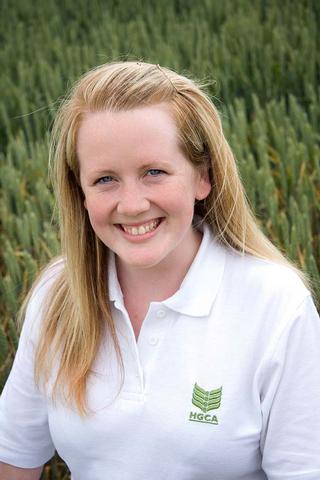Amie Burke

I am a... project executive
Amie Burke is a Project Executive for business improvement with HGCA (the home-grown cereals authority). She graduated in 2010 with a BSc (Hons) Business Management with Marketing.
“I have always had a business head and knew that it was what I was destined for,” says Amie Burke, from Birmingham. But why Harper Adams, when there are so many business courses available across the UK? “
To broaden my horizons – go outside the urban box!” laughs the 25-year-old. “When people know you have graduated from Harper Adams they know that you will have a high level of quality education and experience. It opened my eyes to the agricultural industry and has created opportunities for me in the working world. Because we did such a wide range of topics, I feel I left uni with a great depth of knowledge.”
It is knowledge she has put to good use in her working life: “After graduation I landed a fantastic job with HGCA, one of the seven sectors that sit under AHDB (Agriculture and Horticulture Development Board). AHDB is a levy board that funds research and development and transfers the knowledge back to the farmer. My role is to work with arable growers and identify areas of improvement in their business. I do this by guiding the growers through a piece of software called Cropbench; this helps to calculate the cost of production for each of their crop. On from this, there will be a group meeting called an arable business group that they will attend and that is where they identify differences between themselves and have an exchange of best practice.
“I also project manage two monitor farms in Scotland, which are funded by the Scottish Government. These are similar to the arable business groups, but it is a three-year project that focuses on one farmer. There are six meetings a year, where the local community is invited to help find solutions to the farmer’s objectives. These meetings are practical as we will be on farm seeing the physical business.”
Amie, who spent her placement year as an advances manager with Lloyds TSB, adds: “It is very rare that I am in the office. I travel to all the Scottish monitor farm meetings – that’s 12 a year plus meeting the Scottish Government three times a year. Then I attend as many of the arable business group meetings as possible, plus I am continually meeting with the industry to find opportunities where they can work closer with the growers and save costs. Lots of travelling!”
And her favourite part of the job? “I enjoy getting out on farm and being part of the agricultural community. Coming from a city background, I have never had the opportunity growing up to be in a picturesque landscape, so I make the most of it… especially on sunny days.
I also enjoy meeting different people from all stages of the industry, whether it’s a small farmer in the Highlands of Scotland or having dinner with the Minister of Agriculture.”
Amie developed lots of skills whilst still at uni, through extracurricular activities – being a paid university ambassador, working in the Students’ Union bar, and being a final year warden, looking after other students in halls of residence.
Now, as a graduate, she volunteers as a STEM (Science, Technology, Engineering and Mathematics) ambassador, promoting agricultural careers to children in schools. She advises: “Start to look at the industry as a whole and see where you would like to fit in - there are so many options. Concentrate on developing your experience out of the academic timetable. For example; become an ambassador, be part of a team, help out at your local Open Farm Sunday.”
More from Amie on Harper Adams, placement and careers
Tell us a little about what your course involved.
A great deal of looking at businesses and doing a SWOT analysis. We looked at every aspect of the business environment. The lecturers would arrange real business examples where possible and there were some exciting field trips to local companies. We even had the opportunity to get involved with a local council project, helping them plan with our Project Management module. They prepare you for the real world, so when you go for your first job you can provide real experience and evidence of how you have participated to help reach a goal.
What did you think of the teaching at Harper Adams?
Outstanding.
What are your favourite memories of university?
Being a warden in final year and still getting thanked for making so many people’s time a long lasting great memory.
What did you do on your work placement?
I spent the year at Lloyds TSB, working in their sub-group AMC (Agricultural Mortgage Corporation). My job was Advances Manager and my role was to assist the customer and my team in the completion of a loan. We worked with high value loans i.e. £1million plus. I also had the opportunity to work in the marketing department and rebranded the show van and also attend some agriculture shows.
As I was part of the Lloyds Industrial Placement programme with 200 other students, we were given the opportunity to shadow anyone in the business. I jumped at this and shadowed the Chief Executive Officer on the Trading Floor.
Was it useful?
I learnt an incredible amount in a practical working environment. It also allowed me to be above the competition with one year’s experience already on my CV when I was looking for a graduate job. It was great being part of a large company and understanding how all the theoretical skills I had learnt at uni were put into place in the real world. Earning money and living in London for a year was also a bonus.
How did your qualification/ experiences at Harper Adams aid your career?
By just having a Harper Adams degree, I have gained respect in the agricultural industry. People are very aware of the university and its work and so they know that hardworking graduates are produced there.
What careers, in your experience, are available to land-based graduates?
The rural sector is changing rapidly in the current climate. With the increase in issues such as food security and climate change, there will be great challenges in this sector, but with great challenges comes great opportunities, particularly with jobs. Sustainability is the newest in demand for recruits, as organisations need to supply the growing population with food. Technology is continually eradicating jobs in other sectors, however, agricultural will always need man power.
AHDB and the Agricultural industry are making a conscious effort to encourage the next generation into farming. I am becoming a part of this now and currently sit on the Skills Steering Committee.
What other jobs have you had and how have they helped your career progression?
I worked at an accountancy firm, which helped with all the organising. I worked in the SU bar, which helps me to keep working under pressure. I also gained a counselling qualification and went on to mentor young students - this has helped with my listening skills, which is essential when working with farmers. If you can give them an hour of your time just listening to their problems, then they will be happy to talk through their business with you.





